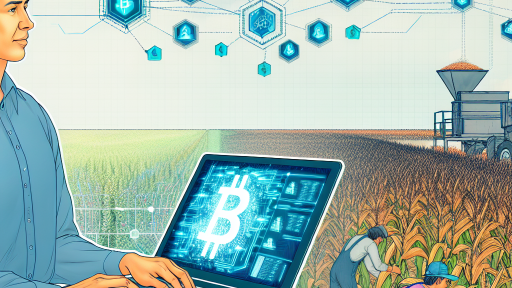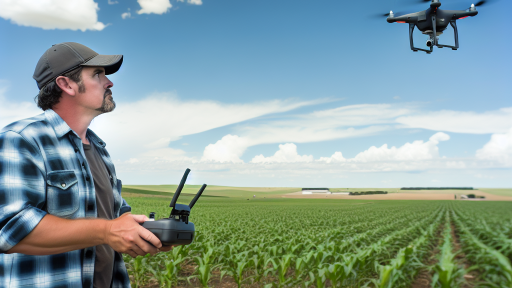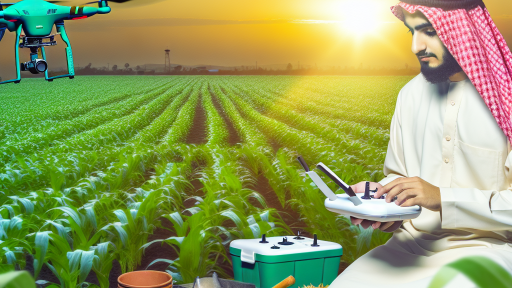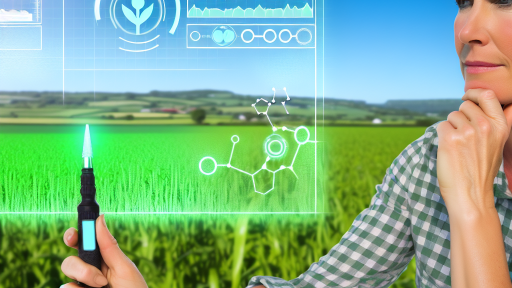Introduction to Blockchain Technology and Its Relevance to Farming
Blockchain technology revolutionizes how data is managed across various sectors.
In farming, it enhances transparency and efficiency in data management.
Farmers can utilize blockchain for secure record-keeping and transaction verification.
This technology provides an immutable ledger, reducing fraud and errors.
By employing blockchain, the agricultural supply chain becomes more trustworthy.
Understanding Blockchain Basics
Blockchain consists of a distributed ledger shared among participants.
Each block contains a list of transactions which are securely linked.
This structure ensures that once data is entered, it cannot be altered easily.
Participants can access a unified view of data in real time.
Benefits for Farmers
Farmers gain numerous advantages by adopting blockchain solutions.
Firstly, it enhances traceability of products from farm to consumer.
This traceability helps in verifying the origin of produce.
Secondly, it facilitates quicker payments through smart contracts.
These contracts automatically execute transactions when conditions are met.
Impact on Supply Chain Management
Blockchain improves efficiency in agricultural supply chains significantly.
Transform Your Agribusiness
Unlock your farm's potential with expert advice tailored to your needs. Get actionable steps that drive real results.
Get StartedIt enables better inventory management through real-time updates.
Moreover, stakeholders can rapidly address quality issues with accurate data.
This immediacy reduces wastage and optimizes logistics operations.
Challenges and Considerations
While blockchain offers benefits, it also presents challenges to farmers.
Adoption requires significant resources and a willingness to learn new technology.
Additionally, the initial setup might seem complex for some.
Fortunately, various organizations provide support and training for adoption.
As awareness grows, more farmers are likely to embrace blockchain solutions.
Current Data Management Challenges in the Agricultural Sector
Inconsistent Data Sources
Farmers often rely on multiple data sources to gather crucial information.
This leads to inconsistencies in data collected across fields.
Additionally, variations in data formats complicate analysis.
This inconsistency can hinder decision-making and operational efficiency.
Data Accessibility Issues
Accessing agricultural data can be challenging for many stakeholders.
Farmers may struggle to obtain real-time insights about their crops.
This lack of accessibility can delay timely interventions.
Furthermore, data might be stored in disparate locations, complicating retrieval.
Data Security Concerns
Data security poses significant risks in the agricultural sector.
Farmers face threats of data breaches that can compromise sensitive information.
As a result, many are hesitant to adopt digital solutions.
Moreover, improper data handling can lead to loss of trust among consumers.
Challenges in Data Integration
Integrating data from various platforms often presents challenges.
Many farmers use different software for tracking and management.
This fragmentation makes it difficult to create a unified data view.
Consequently, operational inefficiencies may arise from poor data integration.
Showcase Your Farming Business
Publish your professional farming services profile on our blog for a one-time fee of $200 and reach a dedicated audience of farmers and agribusiness owners.
Publish Your ProfileLimited Analytical Tools
Many agricultural businesses lack access to advanced analytical tools.
This limitation restricts their ability to make data-driven decisions.
Farmers often depend on basic data analysis techniques.
As a result, they may miss important trends affecting their crops.
Regulatory Compliance Difficulties
Meeting regulatory requirements can be a daunting task for farmers.
They must maintain accurate records to comply with government standards.
However, various data management systems may not facilitate compliance.
This gap can lead to potential fines or penalties for farmers.
Lack of Training and Education
Many farmers have limited knowledge of data management technologies.
This knowledge gap can prevent efficient data utilization.
Additionally, the rapid evolution of technology can overwhelm stakeholders.
Thus, ongoing education and training are essential for effective data management.
How Blockchain Enhances Traceability in Food Supply Chains
Overview of Blockchain Technology
Blockchain technology allows for secure and transparent data sharing.
This decentralized system ensures all parties have access to the same information.
Consequently, it facilitates better decision-making across the supply chain.
Importance of Traceability
Traceability in the food supply chain is crucial for safety and quality assurance.
It allows consumers to know where their food comes from.
Moreover, it helps producers ensure compliance with safety standards.
Effective traceability can prevent foodborne illnesses and recalls.
Blockchain’s Role in Enhancing Traceability
Blockchain provides an immutable ledger of transactions along the supply chain.
This ensures that data cannot be altered or deleted.
As a result, every movement of the product can be tracked in real time.
Each transaction is time-stamped and linked securely, ensuring transparency.
Case Studies of Successful Implementation
Companies like IBM and Walmart have adopted blockchain for traceability.
Walmart uses blockchain to trace the origin of produce quickly.
This approach improves their response time during food safety issues.
Similarly, Nestlé utilizes blockchain to track its products from farm to shelf.
Challenges and Considerations
Despite its benefits, implementing blockchain faces several challenges.
Interoperability with existing systems can complicate integration.
Furthermore, the initial costs of implementation may deter smaller farms.
Education and training are essential for maximizing blockchain’s potential.
The Future of Blockchain in Farming
The future looks promising for blockchain in agriculture and food systems.
As technology advances, costs are likely to decrease.
More farms will then be able to adopt this innovative solution.
Ultimately, blockchain can lead to a safer, more efficient food supply chain.
You Might Also Like: The Future Of Farming: Embracing Agri-Fintech For Long-Term Success
The Role of Smart Contracts in Automating Farming Processes
Introduction to Smart Contracts
Smart contracts revolutionize farming processes through automation.
They simplify complex tasks using blockchain technology.
For instance, farmers can set terms that execute automatically.
This eliminates the need for intermediaries in transactions.
Showcase Your Farming Business
Publish your professional farming services profile on our blog for a one-time fee of $200 and reach a dedicated audience of farmers and agribusiness owners.
Publish Your ProfileStreamlining Supply Chain Management
Smart contracts enhance supply chain efficiency in agriculture.
They ensure transparency among all parties involved.
Farmers can track inventory and manage deliveries more effectively.
Furthermore, they can automate payment upon delivery confirmation.
Enhancing Crop Management
Smart contracts facilitate better crop management strategies.
Farmers can utilize data to make informed decisions.
For example, they can automate irrigation schedules.
This reduces water waste and improves crop yield.
Improving Quality Assurance
Ensuring quality is crucial in farming.
Smart contracts monitor product quality throughout the supply chain.
This minimizes risks associated with product recalls and disputes.
Additionally, they can validate certifications for organic produce.
Implementing Automated Payments
Automated payments enhance financial transactions in farming.
Smart contracts facilitate timely transactions between parties.
They reduce the chances of delays and disputes over payments.
Consequently, farmers maintain better cash flow management.
Facilitating Data Sharing and Privacy
Smart contracts enable secure data sharing among stakeholders.
Farmers can share sensitive information without risks.
This promotes collaboration while maintaining privacy and control.
Implications of Smart Contracts on Farming
Smart contracts transform agricultural practices significantly.
By automating processes, they increase efficiency and transparency.
As adoption grows, the farming industry will become more streamlined.
Delve into the Subject: Using Blockchain For Enhanced Record Keeping In Agricultural Operations
Case Studies: Successful Implementations of Blockchain in Agriculture
Honest Harvest Case Study
Honest Harvest is a food cooperative based in California.
The cooperative implemented blockchain to track organic produce.
This technology ensured transparency in every transaction.
Customers accessed real-time data about their food sources.
The initiative increased consumer confidence significantly.
IBM Food Trust Initiative
IBM partnered with Walmart to enhance food safety.
The Food Trust Initiative uses blockchain for supply chain visibility.
This system allows tracking of food products from farm to store.
It enables quick identification of contamination sources.
As a result, it decreased food waste and increased safety.
AgriDigital Platform
AgriDigital is a blockchain-based grain payment platform.
This innovative solution streamlines grain trade processes.
It allows farmers to get paid immediately after delivery.
The platform reduces paperwork and enhances efficiency.
Farmers appreciate the increased cash flow and reduced risk.
VeChain in Viticulture
VeChain is applying blockchain technology in wine production.
This solution tracks the entire journey of wine from vineyard to table.
Showcase Your Farming Business
Publish your professional farming services profile on our blog for a one-time fee of $200 and reach a dedicated audience of farmers and agribusiness owners.
Publish Your ProfileConsumers scan a QR code to check a wine’s origin and authenticity.
This initiative reduces counterfeiting and enhances brand trust.
As a result, wine producers experience improved consumer loyalty.
Agriculture 4.0 and Data Management
Agriculture 4.0 integrates IoT and blockchain technologies.
Farmers can monitor crop health and soil conditions effectively.
Data collected is secure and easily accessible through blockchain.
This real-time data enables informed decision-making in farming.
Consequently, farmers achieve higher yields and lower costs.
Delve into the Subject: Integrated Pest Management Strategies with Modern Technology

Benefits of Decentralized Data Management for Farmers and Stakeholders
Enhanced Data Transparency
Decentralized data management creates a transparent environment for farmers.
Stakeholders can easily access essential information about crop performance.
This transparency helps build trust among all participants in the farming ecosystem.
Increased Data Security
Decentralization significantly enhances data security in farming operations.
Data stored on multiple nodes prevents unauthorized access and tampering.
Farmers can confidently share sensitive information without fearing data breaches.
Streamlined Collaboration
Decentralized systems encourage collaboration among farmers and stakeholders.
They facilitate real-time data sharing across the entire agricultural supply chain.
This connectivity boosts efficiency in decision-making processes.
Cost-Effective Solutions
Blockchain reduces costs associated with traditional data management systems.
It minimizes the need for intermediaries and paperwork.
Thus, farmers can focus their resources on production instead of administrative tasks.
Improved Traceability
Decentralized data management provides robust traceability of food products.
This feature helps ensure quality control and compliance with regulations.
Consumers increasingly demand transparency about the origin of their food.
Empowered Farmers
With access to direct data, farmers can make informed decisions.
They can analyze their agricultural practices and adapt accordingly.
This empowerment leads to better yields and sustainable farming practices.
Encouragement of Innovation
Decentralized systems stimulate innovation in the agricultural sector.
Farmers can experiment with new techniques and share their successes easily.
This environment accelerates the adoption of cutting-edge agricultural technologies.
Find Out More: Enhancing Farm Efficiency Using AI
Potential Barriers to Adoption of Blockchain Solutions in Farming
Understanding Existing Infrastructure
Many farms operate with legacy systems that are not compatible with blockchain technology.
Farmers may lack the motivation to invest in new systems due to perceived complexities.
Additionally, integrating blockchain with existing infrastructure often involves significant costs.
Knowledge Gaps Among Stakeholders
Not all farmers and agricultural workers understand blockchain technology.
This gap creates resistance to adopting new methods and solutions.
Training programs can help bridge this knowledge gap significantly.
However, organizing such training can be time-consuming and resource-intensive.
Regulatory Challenges
Blockchain technology faces regulatory uncertainty in many regions.
Compliance with laws can be complicated due to varying standards across jurisdictions.
Showcase Your Farming Business
Publish your professional farming services profile on our blog for a one-time fee of $200 and reach a dedicated audience of farmers and agribusiness owners.
Publish Your ProfileThis uncertainty can deter investors and early adopters from pursuing blockchain solutions.
Data Privacy Concerns
Farmers often worry about the security of their data on a blockchain platform.
While blockchain offers transparency, it can also expose sensitive business information.
Addressing these privacy concerns is crucial for broader acceptance of blockchain.
Investment and Capital Constraints
Implementing blockchain solutions requires considerable financial investment.
This is often a barrier for small and medium-sized farms.
Access to funding remains a significant hurdle for technology adoption.
Resistance to Change
Change management is a critical factor in any technology adoption.
Many farmers are accustomed to traditional practices and may resist transitioning.
This cultural inertia can slow the pace of adopting innovative solutions.
Engaging farmers in discussions about the benefits of blockchain is essential.
Interoperability Issues
Blockchain solutions need to work seamlessly with other technologies.
However, the lack of standards can hinder interoperability.
This can lead to complications and inefficiencies in data management.
Market Acceptance and Maturity
Blockchain technology is still in its early stages in agricultural applications.
Market acceptance may take time as stakeholders assess its effectiveness.
Demonstrating successful use cases can help build trust and interest.
Future Trends: The Evolution of Blockchain Technology in Agriculture
Advancements in Data Transparency
Blockchain technology enhances data transparency within the agricultural supply chain.
Farmers can track their products from field to market effortlessly.
As a result, consumers gain trust in food safety and sourcing.
This transparency also encourages ethical farming practices.
Integration with Internet of Things (IoT)
Blockchain and IoT create a powerful synergy for agriculture.
Sensors can collect real-time data about soil conditions and crop health.
Such data gets securely recorded on the blockchain.
This integration improves decision-making for farmers significantly.
Decentralization of Market Access
Blockchain facilitates decentralized marketplaces for farmers.
These platforms reduce reliance on middlemen in the supply chain.
Farmers can engage directly with consumers for better pricing.
This accessibility fosters economic empowerment for smallholders.
Improved Supply Chain Efficiencies
Blockchain streamlines various processes in the supply chain.
It minimizes paperwork and reduces chances for fraud.
Smart contracts automate transactions between stakeholders.
Thus, operational efficiencies lead to lower costs and timely deliveries.
Future of Traceability Innovations
Traceability emerges as a significant application for blockchain in agriculture.
Farmers can easily trace product origins and quality over time.
This innovation aligns with growing consumer demand for full product transparency.
Furthermore, it helps in quick recalls if safety issues arise.
Challenges and Considerations
Despite the potential, challenges remain in implementing blockchain technology.
Infrastructure limitations in rural areas can impede widespread adoption.
Additionally, education on using blockchain solutions is essential for all stakeholders.
Showcase Your Farming Business
Publish your professional farming services profile on our blog for a one-time fee of $200 and reach a dedicated audience of farmers and agribusiness owners.
Publish Your ProfileInvestments in training and resources are critical for success.
Additional Resources
Blockchain Technology for Agriculture: Applications and … – Frontiers
Partnerships for Climate-Smart Commodities Project Summaries …
[E-Books for Sale]
500 Farming Tax Laws Simplified: The Ultimate Global Guide for Farmers
$19.99 • 500 Farming Tax Laws • 154 pages
Maximize your farm’s savings with 500 simplified tax laws, tips, and strategies in this essential farmer’s guide!
See All 500 Farming Tax Laws of this E-Book
2,000 Technological Solutions to Revolutionize Your Agribusiness: A Comprehensive Global Guide for Farmers
$19.99 • 2,000 Technological Solutions • 343 pages
Discover 2,000 cutting-edge technologies to transform your agribusiness. Boost productivity and sustainability today!




